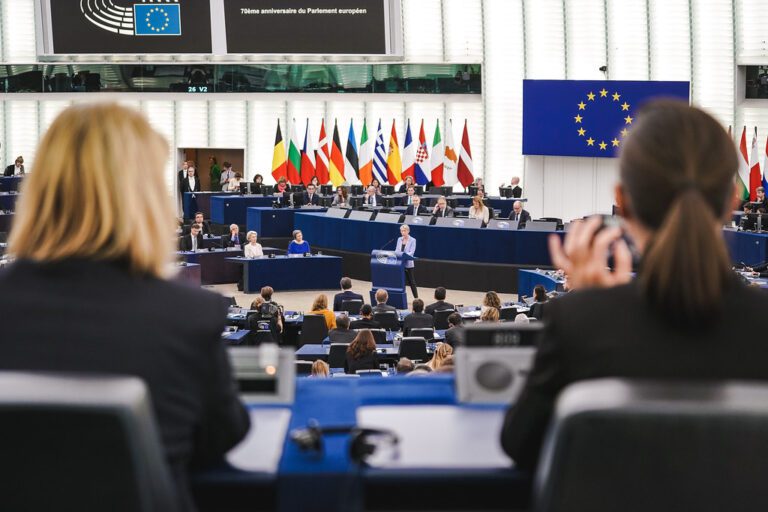
As long as China remains incapable of clearly communicating its global visions, it will not be able to reform the global order as a “responsible great power” but will only disrupt it, regardless of its intentions.
Since Xi Jinping assumed power in 2012/2013, China has become more explicit about its ambitions to reform the global order.
Beijing has not systematically questioned the fundamentals of the current global order but rather increased its ability to effectively maneuver within the system (e.g., by strengthening its role within the UN). At the same time, China has fostered regional China+x mechanisms (e.g., China+Africa, China+Central Asia, or China+Arab States) and regional organizations including the SCO and the BRICS+ to push its policy agenda where it is unable to do so within established international mechanisms.
The Chinese leadership prioritizes establishing close relations with states from the “global South”, many of which share Beijing’s assessment about the need to reform the global order. China also points to ‘Western’ double standards, in particular criticizing the global role of the US.
Xi Jinping’s Global Initiatives
The latest example of China’s shaping vision of the global order includes the ‘Position paper on global governance reform’ issued by the Chinese Ministry of Foreign Affairs on September 13, 2023 and the white paper on the Global Community of Shared Future from September 26, 2023.
As the former document underlines, the central elements of Beijing’s vision are (1) The concept of a Community of Shared Future for Mankind (人类命运共同体); (2) The Belt and Road Initiative (一带一路倡议); (3) The Global Security Initiative (全球安全倡议); (4) The Global Development Initiative (全球发展倡议); (5) the Global Civilization Initiative (全球文明倡议).
Rather than laying out a concrete framework of what a desired global order would look like, China’s global initiatives primarily list general principles. This approach opens the door to ambiguity, while Beijing appears to remain the sole legitimate interpreter.
This high level of abstractness and flexibility reflects Beijing’s domestic approach to policymaking. In China, pilot projects are generally implemented before concrete and binding standards are set. With the global initiatives, Beijing projects its domestic approach to policymaking to the global level. However, insufficient translation, definition, and contextualization efforts by the Chinese side remain Beijing’s key weakness in effectively operationalizing its visions.
Under Xi Jinping, the Community of Shared Future for Mankind (CSFM) has evolved into the key Chinese narrative of a global order free from institutionalized asymmetries favoring Western states. In September 2015, during his first address to the UNGA, Xi laid out the main components, namely (1) equal Partnerships, (2) a new security architecture, (3) common development, (4) inter-civilizational exchanges, and (5) green development.
The CSFM reflects Beijing’s general position to strengthen the role of the state and classical elements of international law (e.g., the crucial importance of the principle of sovereignty) while reducing the role of the individual. Nevertheless, in its essence, the CSFM concept remains fluid and ill-defined.
Official Chinese documents point to the Belt and Road Initiative (BRI) as a crucial element in implementing the CSFM. The BRI, launched in 2013, prioritizes (1) intergovernmental cooperation, (2) reduction of trade barriers, (3) infrastructure connectivity, (4) financial integration, and (5) people-to-people exchanges. It serves as the umbrella of China’s foreign policy and focuses on establishing China-centered networks around a broad area of policy areas (including cyber, health, law-enforcement cooperation, green tech, and agriculture, to name a few).
While Beijing promotes the BRI as a global initiative, it prioritizes states from the “global South”, framing the BRI as a non-western path toward economic development and political stability. Nevertheless, the BRI suffers from the same ambiguity problem as the CSFM as it relies primarily on abstract concepts (e.g., win-win cooperation) and a network of legally non-binding Memoranda of Understanding.
The GSI, GDI, and GCI may be regarded as concretization steps of the CSFM. In his 2015 speech before the UNGA, Xi Jinping highlighted a “new security architecture,” “common development,” and “inter-civilizational exchanges” as key building blocks of the CSFM. By 2023, those ideas had evolved into the alphabet soup of the three “global” initiatives.
The initiatives convey an implicit critique of the global role of the US. Yet, the reliance on abstract principles remains a key feature. ‘Members’ of the initiatives merely declare their support in joint statements, while it remains unclear whether this leads to any rights or duties in their relationship with China.
In 2021, Xi proposed the GDI during the 76th session of the UNGA General Debate. The key elements of the GDI are “common” and “green development”, reflecting China’s domestic priorities. As part of its global governance reform agenda, Beijing aims to put “development” at the center of the UN system. The Chinese leadership has also been trying to tie the GDI to the UN 2030 Sustainable Development Goals. Potential implications of the GDI include a reduction of the role of the individual (as a subject of international law) and of the prominence of individual human rights versus collectivistic human rights.
The GSI, introduced by Xi in April 2022, prioritizes the notion of “indivisible security” (不可分割的安全), which stems from the Helsinki Accords and has been used by Russia to justify its actions vis-à-vis Ukraine. It further reflects China’s rejection of alliances, which it criticizes as a manifestation of a “Cold War Mentality”.
Through the GSI, China claims to overcome what it claims is the outdated security concept without outlining a feasible pathway to achieve this and offering contradictory principles.
Completing the trifecta, in March 2023, the Chinese leadership introduced the GCI. This initiative promotes the “modernization does not mean westernization” narrative, implicitly questioning “universality” claims by Western governments (e.g., within the international human rights regime).
International Rule-setting with Chinese Characteristics
Beijing’s global initiatives are accompanied by a systemic and strategic pursuit by the Chinese leadership to turn the country into a global rule-setter. In addition to gaining discourse power to reinterpret existing international norms and standards, Beijing aims to generate sufficient technical expertise to sit at the table when it comes to setting new standards and clarifying the most avant-garde grey areas of international law. Here, China is increasingly able to insert its visions in a concrete and effective way. We are merely witnessing the first steps of this development.
Notably, Beijing has been reforming its legal system to match the country’s global interconnectedness. In this regard, the promotion of “foreign-related rule of law” (涉外法治) stands out. It focuses on strengthening China’s ability to protect its citizens and entities from foreign sanctions, “interference, and abuse of long-arm jurisdiction”; increasing China’s ability to apply its laws extraterritorially; encouraging Chinese courts to increase their ability to apply foreign law in China; and training Chinese jurists to understand and apply foreign and international law.
Under the banner of “Xi Jinping Thought of the rule of law” (习近平法治思想), Beijing has outlined the high seas, polar regions, cyberspace, outer space, nuclear security, anti-corruption, climate change, AI, digital economy, internet finance, big data, and cloud computing as priority areas to shape the global order.
China’s Ambiguity Dilemma
While Western states admittedly face the problem of inconsistency (e.g., double standards when applying international law or when pursuing a value-based foreign policy), China struggles to formalize and operationalize its global initiatives.
China’s inability to communicate a clear position on the Russian war of aggression against Ukraine highlights why Beijing has a long way to fulfill its ambitions to be perceived as a “responsible great power”.
According to English translations of official pronouncements, Beijing states that the “legitimate security concerns” of all countries should be respected. At the same time, it points to the crucial role of the “principle of sovereignty and territorial integrity”.
One way of explaining the contradiction is to assume that Beijing aims to introduce “legitimate security concerns” as global legal principle. These could qualify as exceptions for the principle of sovereignty. In theory, major powers could sign up to this idea, given their willingness to break international law for the sake of protecting their ‘legitimate’ security interests and concerns. According to this interpretation, Beijing fundamentally challenges the existing international order.
However, “legitimate security concerns” may also be viewed as a terrible translation of “合理安全关切”. In the official English translation of Chinese documents and speeches at the UN Security Council, “合理” is translated as ”legitimate”. Since the Chinese characters “合理” do not include an element of justification or legitimization in a legal sense, “reasonable security concerns” would be a more suitable translation. To indicate ‘legitimacy’ in a normative sense, the Chinese side could use other characters such as “合法的” or “正当合理的” when referring to “security concerns”.
How to explain the translation? It may be due to ignorance by the Chinese officials of the magnitude those words carry in English (if addressed in the UN Security Council). The Chinese officials may be oblivious that using “legitimate” vs. “reasonable” leads to a contradictory position of the Chinese government’s position regarding Russia’s war against Ukraine. If it is done on purpose, it seriously undermines Beijing’s global ambitions. China cannot have a claim on being a responsible great power when its key position on the war in Ukraine is a contradiction.
On a more general level, as long as Beijing remains incapable of clearly stating its global positions it will not be able to play a constructive role in reforming the global order but disrupt it, regardless of its intentions.
Written by
Moritz Rudolf
MoritzRudolfDr. Moritz Rudolf is a Research Scholar in Law and Fellow at Yale Law School’s Paul Tsai China Center, where he focuses on the implications of China’s rise for the international legal order.


